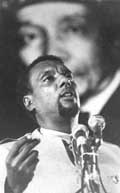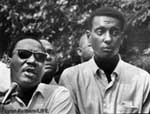11-24-1998
Kwame
Ture: Life of a legend
by James Muhammad
Editor
 Kwame Ture once told a news reporter that when he dies, he
would die a revolutionary.
Kwame Ture once told a news reporter that when he dies, he
would die a revolutionary.
One of Black America's premiere revolutionaries passed November 15,
1998 in
Conakry, Guinea, the West African nation of his mentor, the late Guinean
President Ahmed Sekou Toure.
Bro. Kwame, 57, died of prostate cancer, which he maintained until
his death was "given to me by forces of American imperialism and others
who conspired with them." He had received treatment for the cancer over
the last several years in Cuba and in New York before returning to
Guinea, where he had spent nearly 30 years of his life. Known as Stokely
Carmichael during his early years as a firebrand activist in the Civil
Rights Movement, Bro. Kwame was born in Trinidad on June 29, 1941. He
changed his name in 1978 in honor of President Toure and the late
Ghanaian President Kwame Nkrumah, both of whom befriended the young
Carmichael when he moved to Guinea after becoming disenchanted with
civil rights organizations and the more militant Black Panther Party.
From Guinea, he proclaimed himself a Pan Africanist with a goal of
forming "one cohesive force to wage an unrelenting armed struggle
against the white Western empire for the liberation of our people."
Bro. Kwame was inspired to participate in civil rights sit-ins and
student demonstrations after watching southern cops brutalize dedicated
non-violent youth who attempted to eat at "white-only" restaurants or
use other public accommodations reserved for whites.
It was during that time that he enrolled at Howard University, the
historically-Black college in Washington, D.C., and shortly thereafter
became active in the Freedom Rides-bus trips to the South to join
non-violent protesters at lunch counters and in the streets. He was
jailed numerous times during his years of activism in the South.
 "As one of the more militant of spokespersons of that period,
he held strong views in terms of civil rights and civil liberties, both
here and in Africa," said Rep. John Lewis (D-Ga.), the former chairman
of the Student Nonviolent Coordinating Committee (SNCC) who met Bro.
Kwame in 1961 during the Freedom Rides.
"As one of the more militant of spokespersons of that period,
he held strong views in terms of civil rights and civil liberties, both
here and in Africa," said Rep. John Lewis (D-Ga.), the former chairman
of the Student Nonviolent Coordinating Committee (SNCC) who met Bro.
Kwame in 1961 during the Freedom Rides.
After graduating from Howard University with a degree in philosophy
in 1964, Bro. Kwame joined the SNCC and began registering Black voters
at a time when Black people were being killed by racist whites for such
activity. Articulate and handsome, Bro. Kwame organized the all-Black
Loundes County Freedom Organization in Alabama, which took the emblem of
a Black panther to fulfill a state requirement that all political
parties have a logo. That logo later was adopted by the Black Panther
Party, a Black empowerment group formed by Huey P. Newton and Bobby
Seal.
CALL FOR BLACK POWER
Three weeks before his 25th birthday, in June of 1966, Bro. Kwame was
elected national chairman of the SNCC, replacing Mr. Lewis, and shortly
thereafter raised the cry for "Black Power," a slogan quickly picked up
by the media to describe the growing militancy of some movements and a
slogan that struck fear in many whites.
In his 1967 book "Black Power," Bro. Kwame and co-author Charles
Hamilton, now a professor of political science at Columbia University,
tried to explain the term as "a call for Black people in this country to
unite, to recognize their heritage, to build a sense of community. It is
a call for Black people to define their own goals, to lead their own
organizations."
But the slogan also drove a wedge between him and other more moderate
leaders, and led Bro. Kwame to the Black Panther Party, of which he
became honorary prime minister. But he soon became disenchanted with the
party because it favored working with radical whites.
In 1968, Bro. Kwame married South African singer Mariam Makeba. In
1969, the couple moved to Guinea, with Bro. Kwame declaring, "America
does not belong to Blacks." It was a transitional period for Bro. Kwame
to raise the struggle to an international level and the wellspring from
which emerged the All-African Peoples Revolutionary Party (A-APRP).
The first study cells of the A-APRP were created by Kwame Nkrumah,
but Kwame Ture undertook the assignment to revisit North America to
build the organization under Mr. Nkrumah's organizational banner. Today
the A-APRP works on four continents.
He would carry the A-APRP's message of Pan-Africanism throughout the
world, maintaining that continued progress for Black America could be
made only through mass political organizing on a Pan-African scale. His
call was for a unified Africa under scientific socialism.
After a divorce, he married Marlyatou Barry, a Guinean doctor who now
lives in Arlington, Va. His mother, Mabel, three sisters and two sons
survive him.
WANTED A BLACK UNITED FRONT
In one of his last great efforts to forge an "African United
Front," he lobbied in a day long sit in at the headquarters of the
National Association for the Advancement of Colored People, for the NAACP to unite with
groups like the A-APRP and the Nation of Islam earlier this year. This protest was in
keeping with his pledge made during the testimonial dinner in his honor
held on April 8, 1998, in Washington, D.C. that included many diverse
leaders of the Black liberation movement including Min. Farrakhan.
 At his final appearance at the Nation of Islam's annual
convention in 1998, in an exclusive interview with The Final
Call, Bro. Kwame explained from his wheelchair that, "aside from the
fact that Saviours' Day is now institutionalized ... Min. Farrakhan has
also given it an international perspective."
At his final appearance at the Nation of Islam's annual
convention in 1998, in an exclusive interview with The Final
Call, Bro. Kwame explained from his wheelchair that, "aside from the
fact that Saviours' Day is now institutionalized ... Min. Farrakhan has
also given it an international perspective."
At Saviours' Day 1997, Bro. Kwame, dressed in a flowing white grand
boobah, delivered "revolutionary greetings" to the delegates. He
thanked, on behalf of himself and the A-APRP, Minister Farrakhan and the
Nation of Islam for bestowing on him an award for his years of
humanitarian aid and struggle.
Concerning the man who built the Nation of Islam, Bro. Kwame said,
"The Honorable Elijah Muhammad had a great effect on me. I
will always defend the Honorable Elijah Muhammad because the truth can
smash a million lies."
Min. Farrakhan, in a statement on Bro. Kwame, said his friend set an
example of how to struggle against oppression and life's
difficulties.
"The Black people of America and the progressive people of the world
who struggle for freedom, justice and equality have lost a great soldier
and a great friend," Min. Farrakhan said. "I made a promise to Kwame
that I would work to implement a united front ... that I would strive
for unity with all Black leaders and organizations for the sake of the
liberation and future of our people."
"Brother Kwame was a strong supporter of independent politics," said
Ron Daniels, a political activist and director of the Center for
Constitutional Rights. "He epitomized the phrase 'undying love' for
African people."
Mr. Daniels said Bro. Kwame was a "committed figure to a series of
movements-civil rights, nationalist and Pan Africanist." While the
movements go up and down, Bro. Kwame was consistent, he said.
Conrad Worrill knew Kwame Ture for 32 years and admitted it was hard
to face the death of a friend and comrade. But, said the national
chairman of the National Black United Front, knowing of Bro. Kwame's
illness helped friends prepare for his passing.
"He'd want us to continue the struggle. So we see his passing, or his
transition, as inspiration for us to continue the work that he and many
others in the Pan Africanist movement throughout history have been
struggling for," he said. The goal is a unified, free African continent
as a force for Black liberation worldwide, said Dr. Worrill.
Rev. Jesse L. Jackson, the special envoy to Africa for the U.S.
Government, said he visited Bro. Kwame three times during a recent visit
to the continent. "Though cancer had weakened his body, it had not
weakened his resolve for dignity," he said.
COINTELPRO TARGETS KWAME
 Dr. William Hall and a young Stokely Carmicheal were activist
students at Howard University in the 1960s. Last April, Dr. Hall
co-chaired a testimonial dinner for his longtime friend that brought out
1,000 people, including Min. Farrakhan, Rep. Lewis, Mayor Marion Barry
and ambassadors from several African countries. The event was a response
to calls from people who wanted to see Bro. Kwame, knowing of his
serious illness and plans to go back to Africa.
Dr. William Hall and a young Stokely Carmicheal were activist
students at Howard University in the 1960s. Last April, Dr. Hall
co-chaired a testimonial dinner for his longtime friend that brought out
1,000 people, including Min. Farrakhan, Rep. Lewis, Mayor Marion Barry
and ambassadors from several African countries. The event was a response
to calls from people who wanted to see Bro. Kwame, knowing of his
serious illness and plans to go back to Africa.
"These were friends, people who knew him over a 37-year period who
wanted to again see him, and knew, to some extent, that there might not
be another opportunity to see him," said Dr. Hall.
"He was so personable, if he ever met you, he would recall having met
you. He could recall names and I think if anything we all like to be
remembered and we like to be called by our names," Dr. Hall
continued.
"Cointelpro
saw (Kwame) as a serious threat and sought to ... smear his reputation
by implying he was in bed with them," said Michael Eric Dyson, visiting
professor of African American Studies at Columbia University in New
York, regarding the government's effort to discredit the Black
revolutionary.
"The fact that Stokely had to make that move of repatriation back to
Africa was not only about his own evolving sense of connection to the
Motherland. It was also about the vicious forces of white domination and
supremacy right here in America that have little tolerance for
articulate, independent, prophetic Black figures and he fit all of
those," said Mr. Dyson.
An FBI Cointelpro memo once told of a plan to "bad-jacket" Bro. Kwame
by spreading the word that he is a CIA informant. "It is suggested that
consideration be given to convey the impression that CARMICHAEL is a CIA
informant. One method of accomplishing the above would be to have a
carbon copy of informant report reportedly written by CARMICHAEL to the
CIA carefully deposited in the automobile of a close Black Nationalist
friend," the document said.
"His work was an attempt to make us all Pan Africanist, as we should
be," said Imari Obadele, minister of foreign affairs for the Provisional
Government of the Republic of New Africa and an associate professor of
political science at Prairie View A & M University. "There shouldn't
be anybody who talks about Pan Africanism as if it's some special
category set aside that's set apart for a few people."
Pan Africanism needs to be promoted because so many Blacks in America
are working against Africa's interest and by extension their own
interest, he said.
(Donald Muhammad and Richard Muhammad contributed to this
report.)
Photos:
#1-Kwame Ture, #2-Martin L. King, Jr. and Kwame Ture, #3-Kwame Ture (l),
Minister Farrakkhan (r), #4-Kwame Ture at '60s
rally.
Continuing coverage of memorial observances will be in the next
issue.